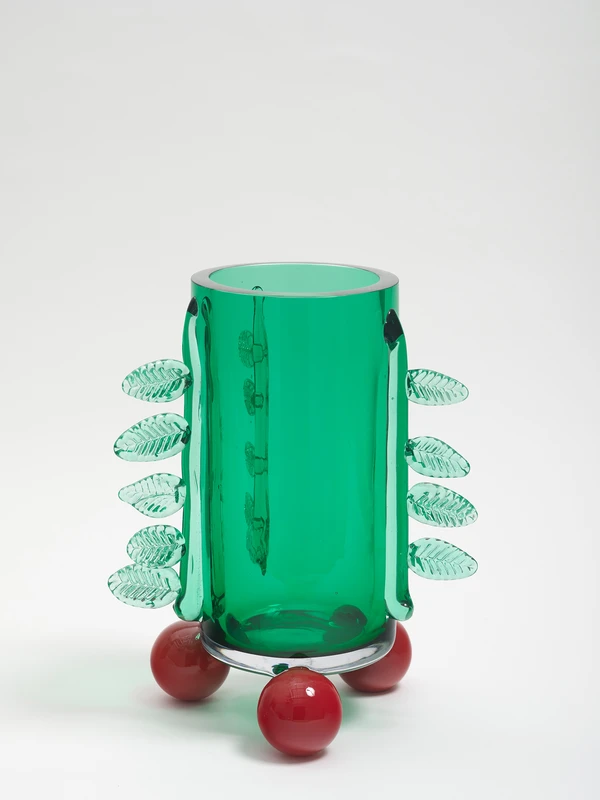Andrea Büttner
7 Oct-13 Nov 2021
PV 7 Oct 2021, 5-8pm


Andrea Büttner’s exhibition presents three recent bodies of work: a series of etchings depicting the harvest of white asparagus, a selection of glass vases and a large-scale photograph of a former plant bed at the Dachau Concentration Camp.
Büttner has recurrently adopted particular foodstuffs, such as potatoes and loaves of bread, as a means to reframe value and insist on the wealth of meaning among the formal and symbolic qualities of sustenance habitually understood as ordinary or commonplace. In this exhibition, Büttner presents a series of etchings, Asparagus Harvest (2021), which depict the harvesting of white asparagus from fields in Belizt, outside of Berlin. These etchings, composed by observing and sketching the harvest en plein-air, consider the hand gestures and postures adopted by labourers in order to harvest efficiently. Büttner’s work attends to the kinds of physical contact involved in such proficient labour: from a stooped posture, fingers locate asparagus tips within dense soil, later snapping the shaft from its root with an asparagus knife.
Asparagus Harvest places focus on a form of being-together, figuring those who continue a labour that is determinedly minor. Each etching traces the artist’s hand in depiction of the very handiwork of the labourer. Utilising the etching as a necessarily tactile process, Büttner foregrounds the contingent social judgement in the valuation of labour between artistic practice, gendered artisanship and seasonal wage labour. By drawing this comparison, Büttner addresses both the material physicality of work as well as its immaterial qualities, including the humiliation inherent to labour exploitation.
The etchings are accompanied by a large-scale photograph of a former plant bed located at the Dachau Concentration Camp Memorial Site. It is part of a series of photographs related to Büttner’s research into the conflicted ethical roots of environmentalism in Germany — specifically the knotted confluence of organic culture and fascist politics. Titled Former plant beds from the plantation and “herb gardens,” used by the Nazis for biodynamic agricultural research, at the Dachau Concentration Camp (2019-2020), Büttner’s photographs record the now heavily overgrown plants beds originally used for biodynamic research under Nazism — including the development of German vitamin C. These photographs attest to the historical co-existence and connectedness of environmentalist discourse and nationalist politics, a cultural specificity rooted in an overlooked, anti-modernist history. As Büttner notes: ‘In a way, all good taste and tastefulness taste bad.’ In its documentary presence, the photographed plant bed depicts both regeneration and concealment. Despite its wild regrowth, the plant bed maintains a rectangular form within the ground, articulating a lateral, abstracted and modernist image itself.
Two glass vases occupy independent plinths throughout the space. Each features spherical nodules which protrude from the base of the vase like an integrated pedestal. While one bears a decoration of green leaves, Büttner’s vases can be collectively characterised by a formal utility, created to hold flowers with tall stems such as gladioli. Titled Vase (bulbs) (2021), the spheres which adorn the vases denote both the undergrowth of the bulb and the blossom above. Throughout this exhibition, Büttner’s contextual specificity distinguishes asymmetrical relations among material labour and immaterial value within agricultural and socio-cultural practices, responding to the questionable sincerity of organic lifestyles and the resurgence of authenticity with an ethical candour.
Andrea Büttner (b. 1972, Stuttgart, Germany), lives and works in Berlin, Germany, and is Professor for Art in the Contemporary Context at Kunsthochschule Kassel. She received a PhD from the Royal College of Art, London, and prior to that studied at the Humboldt University of Berlin and Berlin University of the Arts. Her practice connects art history with social and ethical issues, exploring broad-ranging topics such as poverty, work, community, belief, botany, Catholicism and philosophy. Her work is based on thorough research into specific areas or situations, and is articulated through diverse formats including printmaking, sculpture, painting, photography and video.
Büttner was shortlisted for the 2017 Turner Prize and is a winner of the 2009 Max Mara Art Prize for Women. Significant recent solo exhibitions include What is so terrible about craft?, Kunstverein München, Germany (2019); The Heart of Relations, Hollybush Gardens, London (2019); Shepherds and Kings, Bergen Kunsthall, Norway (2018); Hammer Projects: Andrea Büttner, Hammer Museum, Los Angeles, USA (2017); Beggars and iPhones, Kunsthalle Wien, Austria (2015); Andrea Büttner, Walker Art Center, Minneapolis, USA (2015); BP Spotlight: Andrea Büttner, Tate Britain, London, UK (2014); and Andrea Büttner, Museum Ludwig, Cologne, Germany (2014). Selected group shows include Donation Outset — KW Production series, Museum Abteiberg, Mönchengladbach, Germany; The Roaring Twenties, Guggenheim Bilbao, Spain; The Displacement Effect, Capitain Petzel, Berlin, Germany (all 2021); Parliament of Plants, Kunstmuseum Liechtenstein; Smoke and Mirrors, Kunsthaus Zürich; Amish Quilts Meet Modern Art, Staaliches Textil-und Industriemuseum Augsburg, Germany; and The Botanical Mind, Camden Art Centre, London (all 2020); On Vulnerability and Doubt, Australian Centre for Contemporary Art, Melbourne, Australia (2019); 33rd Bienal de São Paulo (2018); Turner Prize, Ferens Art Gallery, Hull, UK (2017); Broken White, Van Abbe Museum, Eindhoven, the Netherlands (2016); British Art Show 8, UK touring exhibition (2016); and dOCUMENTA (13), Kassel, Germany (2012).
61601e47e2ac3.pdf
Download